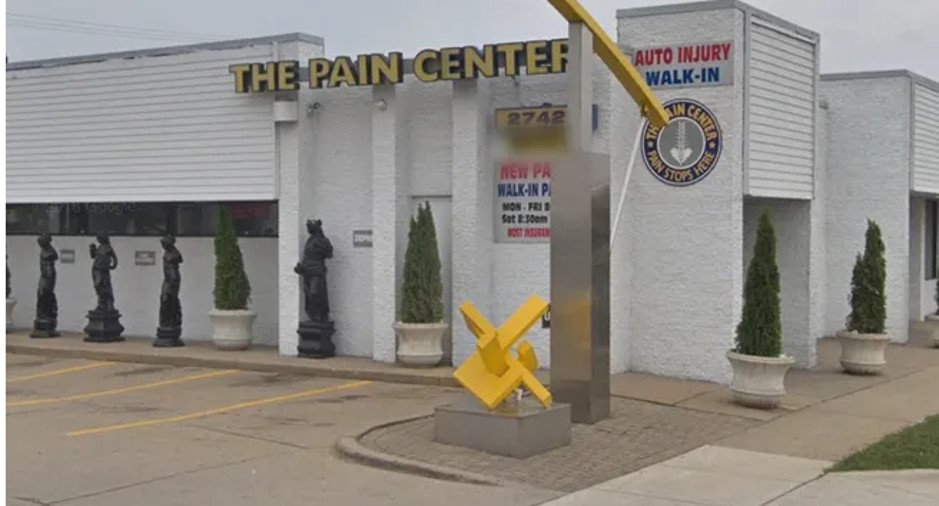
Opioid painkillers such as oxycodone have been identified as one of the primary reasons for the tragic increase in prescription drug overdose deaths, and they are being prescribed in the United States at an unprecedented rate.
The over-prescribing of controlled substances often occurs when there is not a bona-fide physician-patient relationship. Those who are addicted or seeking prescription drugs for non-medical purposes often go from doctor to doctor and pharmacy to pharmacy to try to get multiple prescriptions written and filled. This is known as doctor and pharmacy shopping.
IMPORTANT NOTE: Not all pain management clinics are engaged in criminal activity. Many clinics across the state operate legally and employ trained personnel and doctors who treat patients who legitimately suffer from pain.
Oxycodone was a money-maker for many of these operations. Rogue pain management clinics (pill mills) are a significant source of pain pills available to abusers. Pill mill operators continually devise methods to subvert regulations and investigations while attracting patients.
DEARBORN, MICHIGAN. Dr. Mohammad Derani, Dearborn Medical Clinic. The FBI and Michigan State Police raided the Clinic at Warren and Yinger Avenues after residents complained about disorderly conduct, which prompted an investigation. Months before the raid, community members had sent photos and videos showing the chaos around the clinic. The SAFE Substance Abuse Coalition Board Members also took the initiative and contacted the police, the DEA, the Department of Justice, and State regulators.
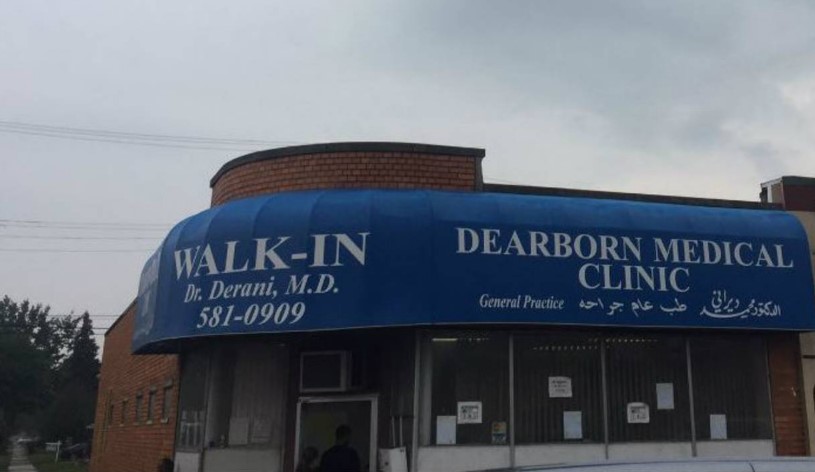
One resident who lived near the clinic had reported several complaints to the police, but they told him to keep calling so the case could be built up through his complaints as well as others. “The Chief kept asking us to be patient because something is coming,” he said. The resident told his neighbors to call the police and complain. He even shared photos and videos he took of drug dealing and filth around the clinic with police as evidence.
The resident said the pill mill trashed the area with beer bottles, garbage, alcohol, and crates.
“These patients would line up at 10 p.m. or 11 p.m. until 9 a.m. when the clinic opened. They often brought chairs and milk crates to sit on and wait. The neighbor said they would urinate in his yard since there were no restrooms available at night.
After learning about the raid on Facebook, other community members shared what they had witnessed when passing by the clinic. One witness said, “Every morning, I pass by there, and I always think it’s Black Friday.”
Dr. Mohammad Derani and his Assistant Manager, Zahra Alwajed, were charged with four counts of delivery of a controlled substance.
Data from the Michigan Department of Licensing and Regulatory Affairs shows that Dr. Derani, a West Bloomfield resident, placed among the top productive prescribers of controlled substances in Michigan in 2015 and 2016. Dr. Derani prescribed an average of more than 43 controlled substances each workday between 2015 and 2017—more than 500,000 pills. Investigators revealed that about half of the opioids ended up on the street, and oxycodone—known as a highly addictive narcotic—was his most prescribed drug. Dr. Derani also wrote prescriptions combining drugs that were lethal.
Addiction is a serious medical condition in which an individual’s behavior has changed to the point where they compulsively seek out a specific class of medicine, in this case, opioids.
Dr. Mohammad Derani. State Police raid the Dearborn Medical Clinic (YouTube Video)
Dr. David Jankowski, 62, was convicted by a federal jury in Detroit on 30 charges related to the unlawful distribution of Schedule II, III, and IV controlled substances and health care fraud. The charges on which he was convicted stemmed from Dr. Jankowski’s operation of Summit Medical Group, a purported medical clinic formerly located in Dearborn Heights and Southfield, MI.
According to the evidence presented at trial, Dr. Jankowski wrote medically unnecessary prescriptions for controlled substances such as Oxycontin, Oxycodone, morphine, hydrocodone, and Xanax. Dr. Jankowski also prescribed controlled substances after receiving cash from patient recruiters who brought patients to his practice.
The evidence demonstrated that Jankowski issued or authorized the issuance of more than 1.7 million Schedule II controlled substances to individuals outside the course of professional medical practice and for no legitimate medical purpose in exchange for compensation. As part of this scheme, Dr. Jankowski also issued or authorized the issuance of more than 800,000 Schedule III controlled substances and more than 870,00 Schedule IV controlled substances.
The evidence also showed that Dr. Jankowski used his access to controlled substances to lure patients into his healthcare fraud scheme. Patients were attracted to his practice by the easy access to controlled substances. Many of these patients had no need for the drugs. Instead, the controlled substances were sold on the streets to feed the addictions of opioid addicts. Trial testimony and exhibits showed that Jankowski then submitted false and fraudulent insurance claims asserting that he had provided necessary treatment to these patients. The claims were submitted to Michigan auto insurance companies, private health care insurers, Medicare and Medicaid.
Based upon these fraudulent claims, Dr. Jankowski received more than $29.3 million from the auto and private insurance companies and more than $6 million from Medicare and Medicaid.
“The improper distribution of prescription drugs outside the course of ordinary medical practice causes significant harm. It is in everyone’s best interests to keep these highly addictive substances off the street, and it is particularly disturbing when a trusted physician is the vehicle for the illegal distribution of opioids,” stated U.S. Attorney Ison. “My office is dedicated to stemming the tide of opioid addiction and the resulting consequences to families in the Eastern District. Law enforcement investigators are aggressively investigating health care fraud and detecting abuses by doctors, and we hope that prosecutions like this one will deter medical professionals from illegally distributing controlled substances and stealing taxpayer funds.”
“Doctors and other medical providers engaged in the overprescribing of opioids for profit places patients at risk and underscores the significance of this investigation,” said Special Agent in Charge Mario M. Pinto of the Department of Health and Human Services, Office of Inspector General (HHS-OIG)
Detroit Field Office of the Federal Bureau of Investigation
According to the National Drug Intelligence Center, an estimated 7,500 pill mills operate in the United States. A pill mill is a type of business that prescribes narcotic medications in more significant numbers than would be prescribed in regular physician offices. State and local investigators came up with the name “pill mills.”

An Oakland County physician was sentenced to 20 years in prison in connection with health care fraud and illegally distributing prescription drugs, including more than a million opioid pills, the U.S. Attorney’s Office for the Eastern District of Michigan announced. Dr. David Jankowski was also ordered by U.S. District Court Judge Bernard Friedman to forfeit more than $35 million in proceeds and property and pay $5.2 million in restitution to Medicare.
A jury found Jankowski guilty of 30 criminal counts, including conspiracies to distribute controlled substances and health care fraud unlawfully, the unlawful distribution of controlled substances, and multiple counts of health care fraud. The charges stemmed from operating Summit Medical Group, a clinic formerly located in Dearborn Heights and Southfield. Federal agents executed search and arrest warrants in June 2017.
Investigators alleged Jankowski, the owner, gave Summit the false appearance of a legitimate medical center when it “was a pill mill supplying narcotics to drug-seeking customers,” the U.S. Attorney’s Office said in a statement. Evidence presented at the trial showed Jankowski wrote medically unnecessary prescriptions for drugs such as Oxycontin, Oxycodone, morphine, hydrocodone, and Xanax, according to the release.
He persuaded a patient to undergo unnecessary shoulder surgery in return for prescribing medically unnecessary controlled substances and offered prescriptions after receiving cash from recruiters who brought other patients to his practice, authorities reported.
“Trial testimony demonstrated that Jankowski issued or authorized the issuance of more than 1 million opioid pills to individuals outside the course of professional medical practice and for no legitimate medical purpose in exchange for compensation,” officials said.
During the trial, the jury heard testimony that Dr. Jankowski sent an unlicensed medical school graduate to perform home visits to Medicare beneficiaries and issue them prescriptions for controlled substances he pre-signed. Though not at the visits, the doctor had fraudulent claims submitted to Medicare as if he performed the services, according to the release.
Dr. Jankowski was also accused of luring patients by providing medically unnecessary controlled substances that were later diverted to the illicit street market. In return, he submitted bogus claims to Michigan auto insurance companies, private health care insurers, Medicare and Medicaid, investigators said.
The Bingham Farms resident, who suffers from chronic and significant health issues, was known as a “generous and caring husband, father, friend and doctor,” said his attorney, A. Summer McKeivier, in a memorandum filed last month.
Seeking a sentence of eight years, McKeivier noted the physician “will not have the wherewithal or means to engage in further criminal conduct. Especially considering Dr. Jankowski will never practice medicine or hold a DEA registration to prescribe controlled substances again and will be excluded from billing health care benefit programs.”
Dr. Jankowski’s Defense Attorney argued that despite the jury’s verdict, Dr. Jankowski “maintains that he was doing what was best for his patients, and as such, he … prescribed within the bounds of his professional medical practice.”
The government painted a different picture in its memorandum seeking a sentence of nearly 25 years. They described him as a “drug dealer with a lab coat” who prescribed potentially lethal combinations of controlled substances.
“Michigan communities have seen devastating losses relating to opioid overdoses in the last five years,” U.S. Attorney Dawn Ison said. “Doctors who illegally dispense powerful prescription drugs bear some of the responsibility for this harm to our community. We hope prosecutions like this one will stop medical professionals from abusing their positions by dealing drugs and stealing from insurance companies and taxpayers.”
“By prescribing medically unnecessary prescription medications and defrauding health insurance programs, this defendant put vulnerable patients at risk and contributed to the high cost of medical care for all of us,” said James Tarasca, Special Agent in Charge of the Detroit Field Office of the Federal Bureau of Investigation.
“Today’s sentence should serve as a warning to any medical professional willing to engage in this type of health care fraud that agents from the FBI and the U.S. Department of Health and Human Services – Office of Inspector General will work diligently and collaboratively to bring them to justice.”
Special Agent in Charge Mario Pinto added: “Medical providers who prescribe powerful controlled substances without regard for medical necessity and submit fraudulent claims for unnecessary services place their patients at risk and waste valuable taxpayer dollars. We will continue to work diligently with our law enforcement partners to ensure that individuals who endanger patients through their prescribing practices and commit fraud against our federal health care programs are held accountable.”

The Indictment alleged that Foster, Edward King, and Brandy King operated several pain clinics in the Metro Detroit area, including Priority One Health Management, Lincoln Park Health Management, and Priority One Health Essentials. At each clinic location, patients were recruited by “patient recruiters,” such as Williams, to see Dr. Bayolo and Dr. Gonzalez Garcia via telehealth. These doctors were paid to illegally issue opioid prescriptions, with no physical examination, for patients who had no legitimate medical need for the drugs.
The indictment charged the defendants with a drug conspiracy involving Schedule II controlled substances, including Oxycodone, Oxymorphone, Oxycodone-Acetaminophen (Percocet), and Hydrocodone (Norco), some of the most addictive and commonly diverted opioids having a significant street value. Charged in the indictment were:
Angelo Foster, 33, Detroit, Michigan
Brandy King, 33, Detroit, Michigan
Dr. Juan Bayolo, 48, Lake Mary, Florida
Dr. Renee Gonzalez Garcia, 62, Henderson, Nevada
Latrina Williams, 45, Sterling Heights, Michigan
Edward King, 33, Northville, Michigan
As alleged in the indictment, these telehealth appointments allowed members of the conspiracy to receive cash payments in exchange for controlled substance prescriptions issued by doctors. According to the indictment, Drs. Bayolo and Gonzalez Garcia, along with other medical professionals, prescribed more than 500,000 dosage units of Schedule II controlled substances. The prescribed controlled substances carried a conservative street value of more than $2.6 million.
“It is particularly disturbing when physicians break their oaths and illegally distribute highly addictive drugs. My office remains committed to pursuing medical providers who abuse their roles as physicians to harm our community.” U.S. Attorney Ison said.
“When medical professionals and others scheme to illegally provide medically unnecessary prescription drugs, they put patients at risk and drive up the cost of health care for everyone,” said James A. Tarasca, Special Agent in Charge of the FBI’s Detroit Field Office. “The FBI and our law enforcement partners will continue to investigate this type of health care fraud scheme and bring those who operate these criminal schemes to justice.”
“As the fight against the opioid crisis continues, our agency remains committed to investigating those – including medical professionals – who seek to profit from scams involving powerful controlled substance medications,” said Special Agent in Charge Mario M. Pinto of the U.S. Department of Health and Human Services, Office of Inspector General. “We will continue to work closely with our law enforcement partners to detect and take action against bad actors who allegedly participate in such schemes.”
“Those willing to profit off addiction are at the center of the opioid epidemic,” said Nessel. “The medical professionals who betrayed their oath to get rich off of substance use disorder are the most insidious actors in this scheme. I am proud of the work done by my department, in concert with our federal law enforcement partners, to pursue and prosecute those who exploited their positions while Michiganders suffered.”
Sixteen Michigan and Ohio-area defendants, including 12 physicians, were sentenced to prison for a $250 million healthcare fraud scheme that included the exploitation of patients suffering from addiction and the illegal distribution of over 6.6 million doses of medically unnecessary opioids.
According to court documents and evidence presented at trial, the scheme involved doctors refusing to provide patients with opioids unless they agreed to unnecessary back injections. Perpetrated through a multi-state network of pain clinics from 2007 to 2018, the evidence established that the clinics were pill mills frequented by patients suffering from addiction, as well as drug dealers who sought to obtain high-dosage prescription drugs like oxycodone. The doctors working at the clinics agreed to work only a few hours a week to “stay under the radar” of the Drug Enforcement Administration (DEA), yet were among the highest prescribers of oxycodone in the State of Michigan.
To obtain prescriptions, the evidence showed that the patients had to submit to expensive, unnecessary, and sometimes painful back injections, known as facet joint injections. The injections were selected because they were among the highest reimbursing procedures rather than based on medical need. Trial testimony established that, in some instances, patients experienced more pain from the shots than from the pain they had purportedly come to have treated and that some patients developed adverse conditions, including open holes in their backs. Patients largely acquiesced to these unnecessary procedures because of their addiction or desire to obtain pills to be resold on the street by drug dealers. The evidence further established that the defendant physicians repeatedly performed these unnecessary injections on patients over several years and were paid more for facet joint injections than any other medical clinic in the United States.
The evidence further established that the proceeds of the fraud were used to fuel lavish lifestyles. Francisco Patino, a doctor and part-owner of the clinics, bought jewelry, cars, and vacations, as well as paid Ultimate Fighting Championship and other mixed martial arts fighters to promote his specialized diet program. Mashiyat Rashid, Patino’s business partner and part-owner of the clinics, purchased private jet flights, courtside tickets to the NBA Finals, and expensive real estate. Other physicians involved in the scheme purchased luxury cars, gold bars, indoor basketball courts and swimming pools. Over $16 million in fraud proceeds was forfeited by the United States from the defendants.
The physicians sentenced by the court included:
- Spilios Pappas, M.D., 63, of Lucas County, Ohio, convicted for conspiracy to commit health care fraud and wire fraud, was sentenced to nine years in prison and ordered to pay $32,287,758 in restitution.
- Tariq Omar, M.D., 63, of Oakland County, Michigan, convicted for conspiracy to commit health care fraud and wire fraud, was sentenced to eight years and ordered to pay $24,243,603 in restitution.
- Joseph Betro, D.O., 60, of Oakland County, Michigan, convicted for conspiracy to commit health care fraud and wire fraud, was sentenced to nine years and ordered to pay $27,417,516 in restitution.
- Mohammed Zahoor, M.D., 53, of Oakland County, Michigan, convicted for conspiracy to commit health care fraud and wire fraud, was sentenced to eight years in prison and ordered to pay $36,645,577 in restitution.
- Zahid Sheikh, M.D., 62, of Macomb County, Michigan, was sentenced to 70 months in prison and ordered to pay $2,088,797 in restitution in connection with his guilty plea to one count of conspiracy to commit health care fraud.
- Abdul Haq, M.D., 76, of Ypsilanti, Michigan, was sentenced to four years in prison and ordered to pay $6,927,046.12 in restitution in connection with his guilty plea to one count of conspiracy to commit health care fraud.
- Steven Adamczyk, M.D., 47, of Bloomfield Hills, Michigan, was sentenced to 42 months in prison and ordered to pay $1,237,570.97 in restitution in connection with his guilty plea to one count of conspiracy to commit health care fraud.
- David Weaver, M.D., 67, of Canton, Michigan, was sentenced to three years in prison and ordered to pay $229,500 in restitution in connection with his guilty plea to one count of conspiracy to commit health care fraud.
- Glenn Saperstein, M.D., 58, of Commerce Township, Michigan, was sentenced to 20 months in prison and ordered to pay $2,722,760.95 in restitution in connection with his guilty plea to one count of conspiracy to commit health care fraud.
- Manish Bolina, M.D., 43, of Canton, Michigan, was sentenced to 20 months in prison and ordered to pay $310,936.95 in restitution in connection with his guilty plea to one count of false statements.
- Hussein Saad, M.D., 42, of Dearborn, Michigan, was sentenced to 10 months in prison and ordered to pay $415,207.54 in restitution in connection with his guilty plea to one count of false statements.
- David Yangouyian, M.D., 58, of Farmington Hills, Michigan, was sentenced to six months in prison and ordered to pay $35,480.98 in restitution in connection with his guilty plea to one count of conspiracy to commit health care fraud.
Other defendants sentenced by the court include:
- Mashiyat Rashid was sentenced to 15 years and ordered to pay over $51 million in restitution in connection with his guilty plea to one count of conspiracy to commit health care fraud and wire fraud and one count of money laundering.
- Yousef Almatrahi, 34, of Romulus, Michigan, the owner of a home health agency, was sentenced to three years in prison and ordered to pay $1,359,512.69 in restitution in connection with his guilty plea to one count of conspiracy to commit health care fraud in connection with his payment of illegal kickbacks for the referral of patients from the clinics for medically unnecessary home health services.
- Hina Qazi, 39, of Rochester Hills, Michigan, the owner of a home health agency, was sentenced to 18 months and ordered to pay $827,713 in restitution in connection with her guilty plea to one count of conspiracy to commit health care fraud in connection with her payment of illegal kickbacks for the referral of patients from the clinics for medically unnecessary home health services.
- Joshua Burns, 43, of Detroit, Michigan, was sentenced to one day in prison and ordered to pay $144,00 in restitution in connection with his guilty plea to one count of conspiracy to defraud the United States and pay and receive illegal kickbacks and bribes in connection with Patino’s referral of urine drug testing and sponsorship of MMA fighters.
The following defendants were scheduled to be sentenced on later dates:
- Yasser Mozeb, 39, of Hamtramck, Michigan, the Office Manager of the Tri-County Clinics, is scheduled to be sentenced in connection with his guilty plea to one count of conspiracy to commit healthcare fraud and one count of conspiracy to defraud the United States and pay and receive illegal kickbacks and bribes.
- Kashif Rasool, M.D., 46, of Troy, Michigan, is scheduled to be sentenced in connection with his guilty plea to one count of conspiracy to commit healthcare fraud.
- Tariq Siddiqi, 44, of Sterling Heights, Michigan, is scheduled to be sentenced in connection with his guilty plea to one count of conspiracy to commit health care fraud in connection with his payment of illegal kickbacks for the referral of patients from the clinics for medically unnecessary home health services.
- Tasadaq Ali Ahmad, 54, of Canton, Michigan, the owner of a home health agency, is scheduled to be sentenced in connection with his guilty plea to one count of conspiracy to commit health care fraud and one count of conspiracy to defraud the United States and pay and receive kickbacks.
- Stephanie Borgula, 41, of Livonia, Michigan, a Licensed Physical Therapist, is scheduled to be sentenced in connection with her guilty plea to one count of conspiracy to commit health care fraud.
- Meiuttenun Brown, M.D., 51, of Toledo, Ohio, is scheduled to be sentenced in connection with her guilty plea to one count of conspiracy to commit health care fraud.
“It is unconscionable that doctors and health care professionals would violate their oath to do no harm and exploit vulnerable patients struggling with addiction,” said Assistant Attorney General Kenneth A. Polite Jr. of the Justice Department’s Criminal Division. “These are not just crimes of greed; these are crimes that make this country’s opioid crisis even worse – and that is why the department will continue to relentlessly pursue these cases.”
“Patients look to physicians and medical professionals for their expertise and knowledge, trusting that they will do what is best to take care of them,” said Assistant Director Luis Quesada of the FBI’s Criminal Investigative Division. “In this circumstance, these medical professionals provided prescription drugs to those with no medical need. It is unacceptable that in this nation’s current opioid crisis, physicians and medical professionals are exploiting the well-being of their patients for profit. Thanks to the diligent work of the FBI and our law enforcement partners, we are able to navigate the important sphere of healthcare fraud and to continue our mission of bringing those who operate these criminal schemes to justice.”

LIVONIA, MICHIGAN. Dr. Francisco Patino, 66, of Wayne County, was convicted for his role in masterminding and executing a complex scheme to defraud Medicare and other health insurance programs by administering medically unnecessary spinal injections in exchange for prescriptions of high doses of opioids to patients.
According to court documents and evidence presented at trial, Dr. Patino excessively prescribed highly addictive opioids to his patients at his medical clinic in Livonia.
The evidence at trial also showed that in 2016 and 2017, Patino prescribed more 30-milligram Oxycodone pills than every other provider in the state of Michigan.
What is Oxycodone and How Is It Used (United States Drug Enforcement Administration)
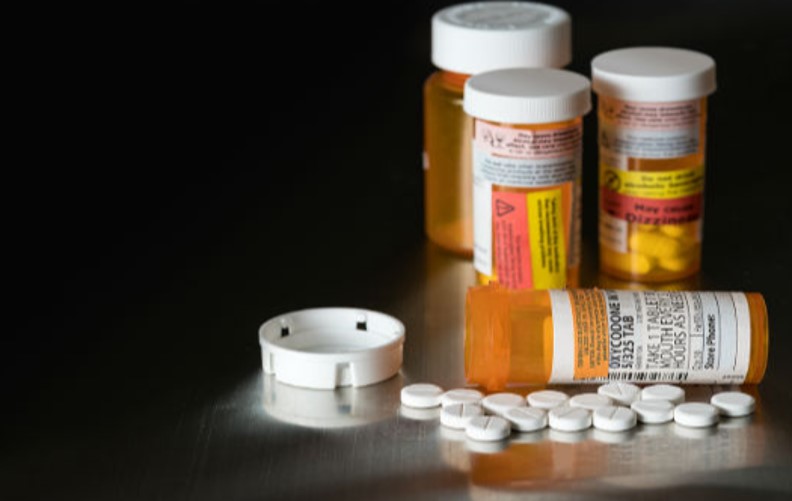
DETROIT, MICHIGAN—19 people were charged in connection with a scheme to sell almost 2 million pain pills and other prescription drugs. The drugs, including oxycodone, oxymorphone, and codeine cough syrup, carried a street value of more than $41 million and helped fuel the nation’s opioid crisis in Metro Detroit and beyond, prosecutors said Thursday.
A team of agents from the FBI, U.S. Drug Enforcement Administration, and Department of Health and Human Services raided medical clinics, pharmacies, and homes in Detroit, St. Clair Shores, and other locations. The criminal case represents the latest crackdown on medical crimes in a region hard hit by fraud allegations involving corrupt doctors and medical professionals in recent years.
Those charged include four doctors and clinic owner John Henry Rankin III, 46, of Detroit, who was accused of hiring doctors involved in the alleged scheme and receiving cash for issuing prescriptions.
“We maintain his innocence,” his lawyers Haralambos Mihas and Nicole Smith said. “He’s not guilty of the things that are alleged by the government.”
The alleged conspiracy started in September 2017 and involved Dr. Rankin giving money and other illegal benefits to the doctors and nurses, according to prosecutors. In return, the medical professionals wrote prescriptions for fake patients. According to the indictment, the alleged scheme relied on several clinics, including:
Preferred Rehab Clinic PC in Warren
New Vision Rehab Center in Detroit
Doctors and co-conspirators charged in the case included:
Dr. Beth Carter, 56, of Southfield
Dr. Robert Kenewell, 52, of Auburn Hills
Dr. Jason Brunt, 50, of Clawson
Dr. John Swan, 30, of St. Clair Shores
Nurse practitioner Jean Pinkard, 63, of Farmington Hills
Nurse practitioner Toni Green, 58, of St. Clair Shores
“Today’s indictments are the result of healthcare professionals allegedly contributing to the devastating opioid crisis instead of working toward its solution,” said Steven M. D’Antuono, special agent in charge of the FBI in Michigan. “The public expects and deserves more from them.”
The pharmacies provided 1,951,148 pills during the conspiracy described by the government, including pain pills in high demand on the black market. According to the indictment, the alleged scheme relied on pharmacies, including:
Detroit New Hope Pharmacy
Synergy Pharmacy in Madison Heights
Nottingham Pharmacy in Detroit
Crownz Medical Pharmacy in Warren
Franklin Healthmart in Southfield
Pharmacist, Maksudali Saiyad, 65, Troy
Pharmacist Adeniyi Adepoju, 61, Warren
Pharmacist Ali Sabbagh, 36, Dearborn Heights
Some of the pharmacists billed private and public insurers, including Medicare and Medicaid, even though the pain pills and other medications were unnecessary, prosecutors said. The pharmacists also allegedly accepted cash from people who recruited patients into the conspiracy.
“Prescription drugs are supposed to go to people who truly need them, not to fake patients or people selling drugs on the streets,” Detroit U.S. Attorney Matthew Schneider said. “We are focusing on charging doctors, pharmacists, and the networks that add to the opioid crisis, and this case is unfortunately yet another example of the serious problem facing Michigan.”
SOUTHFIELD, MICHIGAN. Dr. Shirley Douglas, 70, the owner of a Detroit-area pain clinic and physical therapy clinic, was sentenced to 11 years in prison for her role in a diversion scheme involving more than 500,000 pills of oxycodone and other drugs. Dr. Douglas of West Bloomfield, Michigan, pleaded guilty to one count of conspiracy to distribute controlled substances.
As part of her guilty plea, Dr. Douglas admitted that she conspired with others to distribute medically unnecessary controlled substances, including oxycodone, oxymorphone, alprazolam, hydrocodone, and promethazine hydrochloride, through the selling of appointments with physicians at their pain clinics. Dr. Douglas’s co-defendant, Malik Fuqua, also pleaded guilty.
WARREN, MICHIGAN. Dr. Rajendra Bothra, 77, and Clinic Physician Dr. David Lewis, 41, prescribed more than 13 million doses of opioids and billed medical insurers almost $500 million, according to the grand jury indictment.
Among Pain Center doctors, Dr. Lewis had one of the highest rates of prescribing schedule II pain medication, a category that carries high potential for abuse and includes fentanyl and oxycodone, according to the FBI agent.
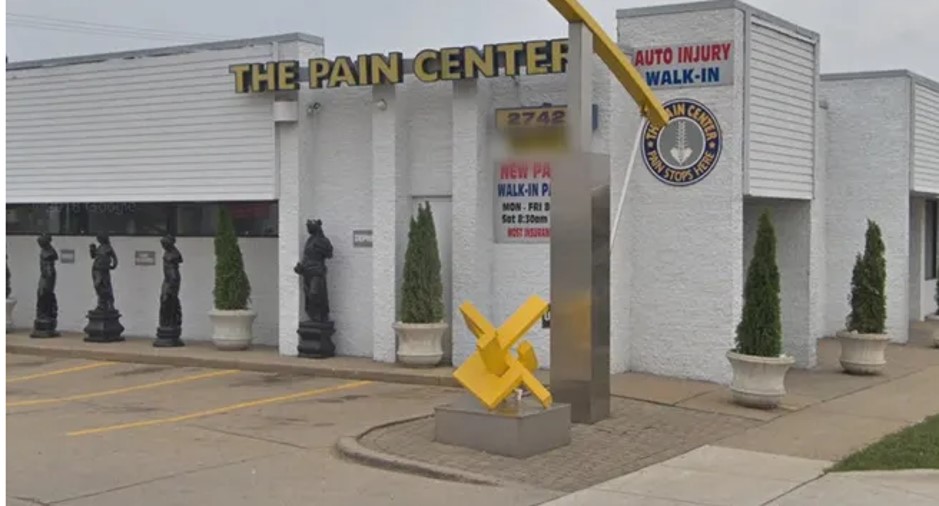
From 2016 to 2018, Dr. Lewis prescribed more than 930,000 doses of medication, and almost 94% were schedule II drugs, a category that includes fentanyl and oxycodone, according to the FBI.
Such a high rate of schedule II drugs is a red flag, said an FBI agent.
The scheme described by investigators involved pain clinics owned by Bothra in Macomb County.
Until federal agents shut down the clinic, Warren’s Pain Center USA had an armed guard, a body count, and standing orders for patients to undergo unnecessary back injections in exchange for pain pills.
Dr. Bothra was being hunted in early December; he just didn’t know it yet.
“This is often indicative of physicians and medical clinics that operate as a ‘pill mill’ with little to no regard for patient health…,” the agent reported.
They also lived a lavish lifestyle during the alleged conspiracy, according to public records and the FBI.
There was a financial incentive for doctors to perform injections and prescribe pain pills. Pain Center doctors received a base salary and bonuses for medical services that could be billed to private or public insurance plans, according to the FBI.
“Dr. Lewis bragged that he earned $90,000-100,000 each month and drove a Rolls-Royce,” the FBI reported.
Secretary of State records showed that Dr. Lewis drove a 1965 Rolls-Royce Silver Cloud, and his Facebook page showed the luxury automobile parked outside his 4,000-square-foot home. Other social media posts feature snapshots of diamond rings and Gucci shoes.
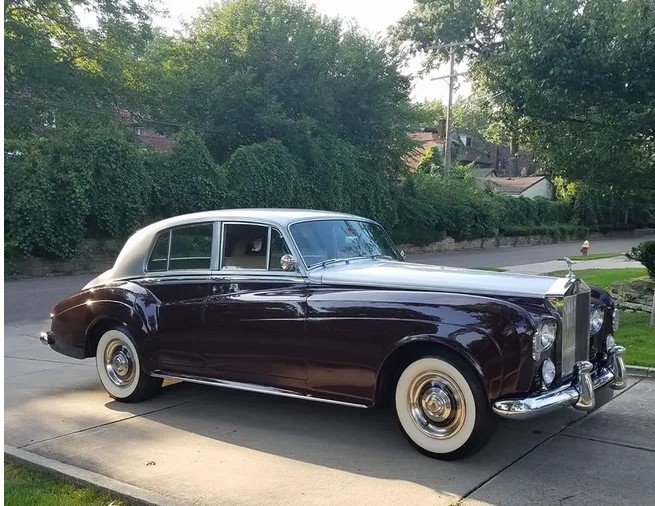
The FBI describes a scheme involving pain pills and doctors billing insurance programs for unnecessary medical services. The services included back injections, sometimes performed by unskilled staff who jabbed patients with needles while hunting for the correct injection site, the FBI agent reported.
One patient walked into Pain Center USA but hobbled out with a cane after receiving back injections, according to an FBI agent.
“MG stated that these appointments were more of a social gathering than a typical medical clinic appointment,” the FBI agent reported. “MG also observed that some of the patients waiting in the parking lot were drinking alcohol and smoking marijuana.”
The clinic was a flurry of activity. Doctors each saw 60-70 patients daily during visits that lasted as little as two minutes.
“It is Physician-1’s understanding that the standing order at the Pain Center is to prescribe pain medication and to conduct unnecessary ancillary services … under unnecessary anesthesia,” the FBI agent reported.
Pain pill scalpers roamed the parking lot at a Macomb County clinic embroiled in one of the nation’s largest healthcare fraud cases, chugging booze, smoking weed, and buying drugs hot off the prescription pad, according to an FBI agent.
The FBI painted a deadly portrait of life inside Pain Center USA, which rose to prominence amid the nation’s opioid epidemic, as part of its federal filing to convince a judge to approve the seizure of almost $26 million from the clinic’s owner and medical team. On Dec. 4, the FBI received permission from U.S. Magistrate Judge Mona Majzoub to seize money from 19 bank accounts linked to Bothra and his team of doctors. According to the FBI, the money was generated by a complex scheme to commit health care fraud and money laundering.
The FBI infiltrated the clinic with an undercover agent and a whistleblowing doctor who claimed to be disgusted by the scene inside Pain Center USA.
“I don’t feel like a physician right now,” the doctor told FBI Special Agent Mark Kroger, according to the filing. “I feel like a fraud.”
The clinic, where one patient overdosed on heroin in a waiting room in October, is closed, and the parking lot is empty, except for a row of statues marking the doctors’ reserved parking spots. They depict Roman goddesses, including Venus and Diana the Huntress.

According to the government, patients left with two things, whether they needed them or not: Medical equipment, particularly back braces, and opioids.
One patient said, “It was easier to get pain medication at the Pain Center than it was to get illicit drugs on the street.”
Business was booming. Patient traffic spilled across Van Dyke into the parking lots of neighboring businesses, including an Italian restaurant and Jim Williams’ heating and cooling shop.
Dr. Bothra was almost finished paving a parking lot at one of the 12 properties his real estate company owned at or near the clinic. Bothra’s arrest halted the project.
Federal agents have spent months trying to pinpoint the value of Bothra’s fortune. Bothra initially told court officials he was worth $10.4 million. His lawyer later said Bothra’s net worth was as much as $35 million. Subpoenaed bank records show Bothra’s clinics received tens of millions of dollars, the FBI agent said.
The clinics had two primary bank accounts through which more than $43.6 million flowed, according to the FBI agent. The money was generated by the health care fraud and wire fraud scheme, and investigators followed the cash as it flowed from the clinics to doctors’ personal bank accounts, according to the FBI.
Federal agents seized at least $25.9 million from doctors indicted in the criminal case, relatives, and the pain clinics.
Dr. Bothra, a surgeon, humanitarian, and native of India who in 1999 received that country’s highest civilian honor, known as the Padmashri, amassed a fortune during his medical career.
Bothra and his real estate company owned four condominiums in downtown Royal Oak, three homes on two continents—including a $300,000 condo in Mumbai, India — and one retirement account worth $8.5 million. That is according to public records and evidence that emerged during Bothra’s fight to be released from jail pending trial.
FBI agents seized at least $17.2 million from bank accounts linked to Bothra and his family, according to a forfeiture notice filed in federal court.
The government left untouched an $8.5 million retirement account that Bothra was trying to liquidate so he could pay lawyers and leave jail on bond. He remained behind bars, though, because prosecutors were appealing a record $7 million bond Bothra received.
Dr. Eric Backos
Nobody charged in the case prescribed more drugs than Dr. Eric Backos. The 66-year-old Bloomfield Hills doctor prescribed more than 5.9 million pills from 2013 to 2018, according to the FBI. More than 86% of the drugs belong to a category that includes fentanyl and oxycodone.
In a 14-month period, three patients received prescriptions from Dr. Backos and died after leaving the clinic and overdosing, according to the FBI.
Warren resident Marcia Groves was a clinic patient and a pain pill addict after suffering a back injury while working at a Warren stamping plant.
Groves, 53, received treatment from three clinics in 2013, including Pain Center USA, according to court records. On Nov. 20, 2013, Groves met with Backos at the clinic, the government alleged.
After a 15-minute office visit, Dr. Backos prescribed morphine and hydrocodone, according to the FBI agent. Three days later, she was dead.
“I found her dead in her bedroom,” daughter Kara Boyd said. “This has put me through so much pain for so many years.”
The Macomb County Medical Examiner’s Office ruled her mother’s death an overdose due to multiple prescription drugs.
Nine months later, a Ferndale man overdosed on multiple prescription pain medications one day after Dr. Backos prescribed oxycodone, according to the FBI.
On New Year’s Day 2015, a Macomb County man overdosed on multiple prescription medications. State records showed the man received a Xanax prescription from a psychiatrist two days earlier and a hydrocodone prescription from Dr. Backos five days before the overdose.
SOUTHFIELD, MICHIGAN. Dr. Rodney Moret, 67, Advance Care Services, was sentenced to 75 months imprisonment for participating in conspiracies to distribute prescription pills illegally and to defraud Medicare. His crimes include over $15 million of prescription drugs and an additional $6 million in health care fraud.
The medical practice purported to be a pain management and HIV infusion clinic but was actually nothing more than a “pill mill.”
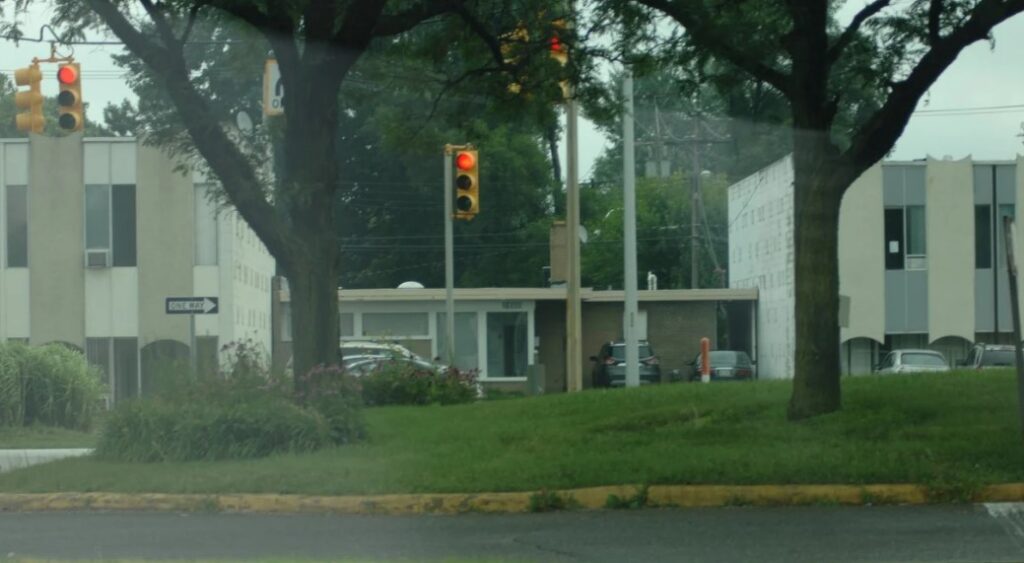
The scheme involved patient marketers using “patients” to obtain medically unnecessary controlled substance prescriptions issued by Dr. Moret, who at the time was a licensed medical doctor. Medicare was billed for examinations and tests that were not conducted properly or not conducted at all. Once the prescriptions were filled, the marketers sold the drugs.
“Rodney Moret, a former physician, intentionally fueled the local opioid epidemic by overprescribing addictive medications to patients for his own personal gain,” said Timothy Waters, Acting Special Agent in Charge, Detroit Division of the FBI. “The message should be clear: any doctor or healthcare professional who prioritizes profit or does harm to their patients under the guise of providing health care will be subject to the full investigative resources of the FBI and our law enforcement partners.”
Fortunately, law enforcement ultimately uncovered the actions of Dr. Moret and his four co-conspirators. The Bureau’s Detroit Field Office opened an investigation into ACS in December 2011 after receiving a referral from the Department of Health and Human Services’ Office of Inspector General concerning suspicious billings from Dr. Rodney Moret. “Shortly after that,” Kramer explained, “an ongoing Detroit investigation into another pill mill led directly to the doorstep of Advanced Care Services, Moret’s employer.
Kramer said that various investigative techniques—including confidential informants, consensual recordings, analysis of financial records, and interviews with ACS employees and patients—uncovered the breadth and depth of the fraudulent activity being perpetrated by Moret and company.
Generally, here’s how the scheme worked:
Two individuals associated with ACS would go out and recruit patients—vulnerable Medicare recipients who were struggling on fixed incomes—to visit Dr. Moret at ACS and receive a cursory exam or sometimes no exam at all.
Dr. Moret would then write them medically unnecessary prescriptions for controlled substances.
The patients would go out and fill those prescriptions and then turn the medications over to the ACS recruiter in exchange for money.
“What made this even worse was that before working at ACS, Moret worked at an addiction treatment clinic, where he saw the consequences of illegal drugs on a daily basis,” Larissa Kramer, special agent, FBI Detroit
“The recruiters, who often personally transported the patients to and from the clinic and their pharmacies, would then sell the drugs on the streets, where they had a lot more value—more than $15 million in total,” Kramer explained.
She also said that Dr. Moret intentionally wrote thousands of illegal prescriptions for drugs like hydrocodone, alprazolam, and promethazine with codeine to patients he knew didn’t need them. And that he knew the ultimate destination of these powerful drugs was the streets of Southeast Michigan.
Meanwhile, the ACS Office Manager—with the total knowledge of the clinic’s owner who had hired Moret in the first place—fraudulently billed $6 million to Medicare for examinations or tests that were not done properly or not done at all in the names of the patients who had received the illegal prescriptions.
Dr. Moret was one of five defendants named in a multi-count first superseding indictment unsealed in February 2016. All defendants, including the owner and manager of ACS, entered guilty pleas to either conspiracy to distribute prescription pills or conspiracy to commit health care fraud. Dr. Moret’s associates also pleaded guilty in connection with their roles in the criminal activity and were sentenced. All five were ordered to pay more than $2.5 million in restitution.
According to statements made at the plea hearing and evidence submitted at sentencing, the clinic operated from 2010 until 2015 and was owned by defendant Jorge Azar. The day-to-day operations of the clinic were managed by defendant Jellie Villalon. Dr. Moret would issue the prescriptions after a cursory examination or no examination at all and often took advantage of the female “patients” who were at the clinic to receive controlled substance prescriptions by sexually molesting or harassing them.
Dr. Moret was responsible for illegally distributing over 700,000 dosage units of Hydrocodone (Vicodin, loratab), more than 240,000 dosage units of Alprazolam, and more than 2 million milliliters of promethazine with codeine cough syrup, worth more than $15 million on the street market. He was responsible for over $6 million in healthcare fraud.
Based upon his offense conduct in this case, on March 31, 2017, Dr. Moret’s license to practice medicine was revoked by the State of Michigan Department of Licensing and Regulatory Affairs, Bureau of Professional Licensing.
Hydrocodone, Alprazolam, and promethazine with codeine cough syrup are controlled substances that may be prescribed by a doctor only for a legitimate medical purpose. A doctor must act in good faith in prescribing these medications. These are powerful and addictive drugs. Hydrocodone is in the opioid class, is easily abused, and can lead to addiction and eventual heroin use.
“Physicians who divert prescription drugs to the street market are contributing to the drug epidemic in the country, and we are focusing our enforcement efforts on stopping them,” stated United States Attorney Matthew Schneider.
“Prescribing controlled substances – such as Hydrocodone – outside the scope of professional practice and without a legitimate medical purpose is illegal,” said Lamont Pugh III, Special Agent in Charge, U.S. Department of Health & Human Services, Office of Inspector General – Chicago Region. “Physicians who engage in this type of behavior put patient health and safety at risk and exacerbate the opioid crisis. The OIG will continue to work with our law enforcement partners to ensure that those who commit these criminal acts are held accountable.”
The case was investigated by the Detroit Field Office of the Federal Bureau of Investigation.
After Dr. Moret’s sentencing in the drug case, Timothy Waters, then-acting head of the Detroit FBI office, said that Moret had “intentionally fueled the local opioid epidemic by over-prescribing addictive medications to patients for his own personal gain.” Waters also warned that “any physician or health care professional who prioritizes profit or does harm to their patients under the guise of providing health care will be subject to the full investigative resources of the FBI and our law enforcement partners.”
The prescription drug abuse epidemic is evolving. U.S. Congress passed the Controlled Substance Act (CSA) to regulate drugs based on their medical value and potential for abuse or dependence.74 The CSA has been amended several times to keep up with issues related to new drugs, drug abuse and the movement of drugs around the world. The U.S. DEA is responsible for enforcing the Controlled Substance Act – including the manufacture, distribution, and dispensing of legally produced controlled substances.
In Michigan, it is possible for a physician to delegate their prescribing authority to a physician assistant, nurse practitioner, or nurse midwife (mid-level practitioners). The mid-level practitioner uses the supervising doctor’s controlled substance license as the basis for such a prescription. However, the DEA does not allow the delegation of a DEA registration from a practitioner to a mid-level practitioner. Instead, the mid-level practitioner must obtain a DEA mid-level controlled substance registration.
Michigan Board of Medicine—Licensing and Regulatory Affairs
Pain management clinics have a role to play in the treatment of chronic pain for Michigan residents, but enforcement of how these clinics operate is sometimes called into question.
A physician must meet all of the requirements necessary to prescribe controlled substances, but must also have a Michigan Drug Control License.
A pharmacist must also have a Michigan Drug Control License issued by the Michigan Board of Pharmacy.
Opioid painkillers such as oxycodone, hydrocodone, and methadone have been identified as one of the primary reasons for the tragic increase in prescription drug overdose deaths, and they are being prescribed in the United States at an unprecedented rate.
Misuse of prescription drugs has led to an increase in emergency room visits, in some areas surpassing the use of illicit drugs as a reason for an ER visit.
When legal or business problems consume a medical practice, the patients often are left without a “medical home” at a most vulnerable time of their lives.

Between 1999 and 2017, an estimated 250,000 Americans died from overdoses involving prescription painkillers, a plague ignited by Purdue Pharma’s aggressive marketing of OxyContin. Families, working class and wealthy, have been torn apart, businesses destroyed, and public officials pushed to the brink. Meanwhile, the drugmaker’s owners, Raymond and Mortimer Sackler, whose names adorn museums worldwide, made enormous fortunes from the commercial success of OxyContin.
In Pain Killer, Barry Meier tells the story of how Purdue turned OxyContin into a billion-dollar blockbuster. Powerful narcotic painkillers, or opioids, were once used as drugs of last resort for pain sufferers. But Purdue launched an unprecedented marketing campaign claiming that the drug’s long-acting formulation made it safer to use than traditional painkillers for many types of pain. That illusion was quickly shattered as drug abusers learned that crushing an Oxy could release its narcotic payload all at once. Even in its prescribed form, Oxy proved fiercely addictive. As OxyContin’s use and abuse grew, Purdue concealed what it knew from regulators, doctors, and patients.
The opioid crisis and drug overdoses continue to devastate our states and local communities.
Donations to Support this Website are Always Welcome.
Nationwide Investigations
How Pain Clinic Owners Turned Patients’ Pain into Enormous Profits
How State and Federal Authorities are Dismantling Pill Mills in the United States
How to Recognize a Pain Pill Mill in Your Community
How Federal Agencies Are Dismantling New York Pain Clinics Vast Pain Pill Operations
Authorities Crack Down on Pharmacists Fulfilling and Dispensing Massive Amounts of Pain Pills
How Federal Agencies are Shutting Down Maryland Pain Clinics Operating as Pill Mills
How Authorities Have Shuttered Georgia Pain Clinics Massive Pain Pill Distribution
How Authorities Are Cracking Down on Virginia Pain Clinics Massive Pain Killer Pill Operations
How Authorities Are Shutting Down Texas Pain Clinics Enormous Pill Prescriptions
How Authorities Are Cracking Down on Rogue Pain Clinics in Florida

How Federal Agencies Are Dismantling Michigan Pain Clinic Doctors Scheme to Distribute Enormous Amounts of Opioid Pain Pills
ADD COMMENTS BELOW
- Essential Christmas Songs for the Holiday Season
- Stylish Outdoor Fire Pits and Patio Heaters
- How to Create an Ergonomic Workspace at Home or Work
- Benefits of Humor and Laughter in Life
- Balancing Success: Practical Self-Care Strategies for Entrepreneurs
- Guides to Backpacking, Mountain Biking and Hiking Georgia
- Ways to Pay It Forward and Change Lives
- Email Marketing Campaigns for Small Business Owners
- Guide to Martha Stewart’s Hugely Successful Concept and Art of Presentation
- Guides to Backpacking and Hiking Canada
- Timeline of Events Leading to Rudy Giuliani’s Legal Troubles
- Backpacking, Hiking, and Camping Safety Guides
- Moving and Relocating to Atlanta: How to Find Your New Home
- Money Matters: Insider Tips to Buying a Home
- Renting vs Owning a Home
- Ways to Build Positive Credit
- Do It Yourself Credit Improvement Process
- A Trail of Clues to the Murder of Nicole Brown Simpson
- How Centra Tech’s Bitcoin Cryptocurrency Scheme Was Hatched and Discovered
- Starting a New Business as a New Mother: Tips for Thriving
- Guides to Backpacking and Hiking the Carolinas
- Guides to Hiking New York State and New Jersey
- Guides to Hiking California and Nevada
- The Tragic Murder of Rebecca Postle Bliefnick
- How a Grad Student Murder Spotlights Female Joggers’ Safety Concerns
- How Massive Commercial Financial Fraud Was Discovered in Singapore
- Did Billy Ray Turner Conspire with Sherra Wright to Kill Former NBA Player Lorenzen Wright?
- How Operation Rebound’s 7-Year Cold Case was Finally Solved
- Mastering DIY Marketing: Essential Skills and Strategies for Small Business Owners
- How a GeoLocation Expert Tracked a Killer
- Transgender Law Enforcement Officer Denied Medical Coverage for Gender Dysphoria
- How Video Surveillance Cameras Helped Identify and Track a Killer
- How Investigators Solved the Murder Mystery of Army Sergeant Tyrone Hassel III
- How a Love Obsession Led to the Brutal Murder of Anna Lisa Raymundo
- How Stephen Grant Tried to Get Away with Killing His Wife
- How Unrelenting Catfish Schemes Led to Fatal Suicide
- How Pain Clinic Owners Turned Patients’ Pain into Enormous Profits
- How to Recognize a Pain Pill Mill in Your Community
- How Authorities Have Shuttered Georgia Pain Clinics Massive Pain Pill Distributions
- How Pain Doctors Massive Opioid Prescriptions Lead to Pain Pill Overdose Deaths
- How Authorities Are Dismantling Pennsylvania Pain Clinics Prescribing Excessive Amounts of Opioid Pain Pills
- How Authorities Are Dismantling Alabama Pain Clinics Pain Pill Schemes
- How the Gilgo Beach Homicide Investigation Has Progressed
- How NYC Architect was Linked to Three Women’s Remains Found on Gilgo Beach
- How Investigators Discovered a Serial Killer Hiding in Plain Sight
- How Police Discovered the Concealed Murders of the Chen Family
- How a Vicious Child Custody Battle Led to the Murder of Christine Belford
- How Authorities Finally Captured a Serial Killer in Southern Louisiana
- How Authorities Are Busting Pill Mills in The Carolinas
- How Montgomery County Police Quickly Unraveled the Murder of a Retail Store Employee in Bethesda
- How a Child Rapist and Murderer Almost Got Away with His Crimes in England
- How Authorities Are Dismantling Pill Mills in the United States
- How Federal Agencies Are Dismantling Michigan Pain Clinic Doctors Scheme to Distribute Enormous Amounts of Opioid Pain Pills
- How Authorities Are Cracking Down on Virginia Pain Clinics Massive Pain Pill Operations
- How Authorities Are Honing in on Kentucky Pain Clinics Distributing Opioid Painkiller Pills for Profit
- How Federal Agencies Are Shutting Down Maryland Pain Clinics Operating as Pill Mills
- How Federal Agencies Are Dismantling New York Pain Clinics Vast Pain Pill Operations
- How the Senseless Murder of Tequila Suter Was Quickly Solved
- How Authorities Are Dismantling Ohio Pain Clinics Prescribing Excessive Pain Pills
- How Authorities are Dismantling Tennessee Pain Clinics Prescribing Massive Quantities of Opioid Pain Pills
- How State and Federal Agencies Are Shuttering California Pain Clinics Huge Distribution of Opioid Pain Pills
- How Authorities Are Shutting Down Texas Pain Clinics Enormous Pill Prescriptions
- How Authorities Are Cracking Down on Rogue Pain Clinics in Florida
- George Brothers Used Pain Clinics to Disburse Oxycodone Pain Killer Pills
- How Authorities Have Convicted Pharmacists Fulfilling and Dispensing Massive Amounts of Pain Pills
- Georgia Election Workers Defamation Lawsuit and Trial
- Rudy Giuliani’s Election Fraud Allegations and Ensuing Lawsuits
- British Singer George Michael’s Last Christmas
- Shaping Tomorrow’s Leaders
- Kathleen Peterson’s Mysterious Staircase Death: Accident or Homicide?
- How Police Officer Stephanie Lazarus Almost Got Away with Murder
- Mysterious Staircase Death Investigations
- Elizabeth Ratliff’s Mysterious Staircase Death in Germany
- The Death of Vincent Foster Remains a Mystery 30 Years Later
- Biloxi Murder Conspiracy: A High-Stakes Crime